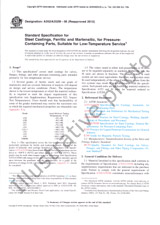We need your consent to use the individual data so that you can see information about your interests, among other things. Click "OK" to give your consent.
ASTM D7539-10(2020)
Standard Practice for Using a Test Chamber for Humidity Conditioning of Test Panels of Pavement Marking Paints
Translate name
STANDARD published on 1.6.2020
The information about the standard:
Designation standards: ASTM D7539-10(2020)
Publication date standards: 1.6.2020
SKU: NS-997847
The number of pages: 6
Approximate weight : 18 g (0.04 lbs)
Country: American technical standard
Category: Technical standards ASTM
The category - similar standards:
Annotation of standard text ASTM D7539-10(2020) :
Keywords:
drying rate or drying time, dry through, no-pick-up, relative humidity, test chamber, washout resistance, waterborne traffic paint,, ICS Number Code 87.040 (Paints and varnishes), 93.080.30 (Road equipment and installations)
Additional information
| Significance and Use | ||||||||||||
|
5.1 The drying rate of organic coatings varies with changes in temperature, air flow, and relative humidity. In particular, the drying rate of waterborne paints depends on the evaporation of water and thus is much more dependent on relative humidity than are solvent based paints or paints that are 100 % solids. Measurement of the rate of drying of waterborne paints under ambient conditions in laboratories cannot be adequately replicated without some control of the drying conditions. A test chamber will be described that provides a means of controlling relative humidity above ambient humidity and minimizing the effects of air flow variability at ambient room temperatures. If desired, the test chamber without water in it and with vents wide open can be placed in a temperature and humidity controlled room to test dry speed at various temperatures as well as humidity while using the chamber to minimize the effect of air flow. 5.2 This practice is particularly useful for testing the drying rate of waterborne pavement marking (traffic) paints where fast dry at elevated ambient humidity is an important feature. For waterborne traffic paints, the test chamber can be used to evaluate dry to no-pick-up (Test Method D711) and water wash-off resistance (Practices D7377 and D7538) at elevated ambient humidity. |
||||||||||||
| 1. Scope | ||||||||||||
|
1.1 Specification D3924 defines a standard environment of 23 ± 2°C and 50 ± 5 % relative humidity and free from drafts for normal conditioning and testing of paint, varnish, lacquer, and related materials. This practice describes a test chamber that allows for control of relative humidity above the ambient relative humidity and minimization of air flow for conditioning of test panels at elevated relative humidity and room temperatures. 1.2 The values stated in inch-pound units are to be regarded as standard. The values given in parentheses are mathematical conversions to SI units that are provided for information only and are not considered standard. 1.3 This standard does not purport to address all of the safety concerns, if any, associated with its use. It is the responsibility of the user of this standard to establish appropriate safety, health, and environmental practices and determine the applicability of regulatory limitations prior to use. 1.4 This international standard was developed in accordance with internationally recognized principles on standardization established in the Decision on Principles for the Development of International Standards, Guides and Recommendations issued by the World Trade Organization Technical Barriers to Trade (TBT) Committee. |
||||||||||||
| 2. Referenced Documents | ||||||||||||
|
We recommend:
Technical standards updating
Do you want to make sure you use only the valid technical standards?
We can offer you a solution which will provide you a monthly overview concerning the updating of standards which you use.
Would you like to know more? Look at this page.




 Cookies
Cookies
